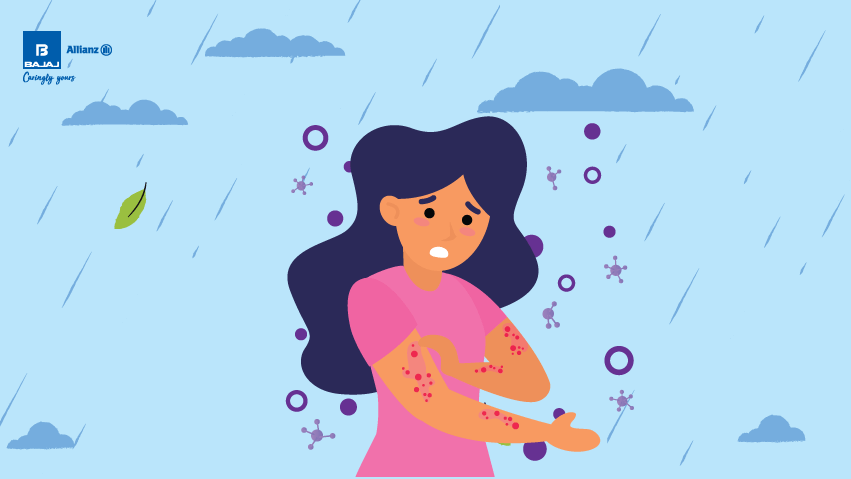The onset of the monsoon season brings relief from the scorching summer heat but also introduces a host of skin problems due to increased humidity and constant dampness. Monsoon skin issues can vary from minor irritations to serious infections, so it's essential to take extra care of your skin during this season.Let's explore the skin problems in monsoon, their types, and effective ways to prevent them.
Common Skin Problems in Monsoon
Skin allergy monsoon is primarily driven by the moist environment, which becomes a breeding ground for bacteria, fungi, and allergens. Here are some common skin problems in monsoon and tips to protect your skin in monsoon:
1. Acne and Eczema
Acne and eczema flare-ups are expected during the monsoon due to the fluctuating humidity levels. The excess moisture can clog pores, leading to breakouts, while eczema can worsen with increased skin irritation. Although, eczema can flare up due to changes in temperature and exposure to potential irritants in the environment.
Prevention and Treatment
●
Keep Skin Clean: Wash your face twice daily with a mild cleanser to remove excess oil and dirt.
●
Use Light Moisturisers: Opt for water-based moisturisers that hydrate without clogging pores.
●
Avoid Heavy Makeup: Heavy makeup can exacerbate acne; use minimal and non-comedogenic products.
●
Consult a Dermatologist: Seek professional advice and treatment for persistent issues.
2. Fungal Infections
The constant dampness and humidity during monsoon create ideal conditions for fungal infections like athlete's foot, ringworm, and jock itch. These infections thrive in moist environments and can be highly contagious. However, persistent infections should be checked by a healthcare professional.
Prevention and Treatment
●
Keep Skin Dry: Thoroughly dry yourself after bathing or getting wet, especially in skin folds.
●
Use Antifungal Powders: Apply antifungal powders in susceptible areas like feet and groin.
●
Wear Breathable Clothing: Choose cotton and other breathable fabrics to reduce sweating.
●
Avoid Sharing Personal Items: Do not share towels, footwear, or clothing to prevent the spread of infection.
3. Hyperpigmentation
Hyperpigmentation, characterised by dark patches on the skin, can worsen during the monsoon due to indirect UV exposure. Even on cloudy days, UV rays can penetrate and stimulate melanin production.
Prevention and Treatment
●
Apply Sunscreen: Use a broad-spectrum sunscreen daily, regardless of the weather.
●
Use Brightening Products: Incorporate products with ingredients like vitamin C and niacinamide to even out skin tone.
●
Consult a Specialist: For severe hyperpigmentation, professional treatments like chemical peels or laser therapy may be necessary.
4. Skin Allergies
Skin allergies are heightened during the monsoon due to increased exposure to environmental allergens. Symptoms can include itching, redness, and rashes, often exacerbated by pollutants and allergens in the air.
Prevention and Treatment
●
Identify Allergens: Identify and avoid known allergens that trigger skin reactions.
●
Use Antihistamines: Over-the-counter antihistamines can help control allergic reactions.
●
Maintain Cleanliness: Keep your surroundings clean and free from dust and mould.
5. Folliculitis
Folliculitis, or inflammation of the hair follicles, often occurs due to bacterial or fungal infections, aggravated by sweat and humidity during the monsoon.
Prevention and Treatment
●
Maintain Hygiene: Bathe regularly and clean your skin to prevent infections.
●
Avoid Tight Clothing: Wear loose, comfortable clothing to reduce friction and sweating.
●
Use Antibacterial Soaps: Antibacterial soaps can help prevent and treat folliculitis.
●
Consult a Doctor: Persistent or severe cases may require medical intervention and prescription medications.
Tips to Protect Your Skin in Monsoon
Taking care of your skin during the monsoon involves a combination of good hygiene practices and using the right skincare products. Here are some practical tips to protect your skin in monsoon:
1. Hydrate Regularly
Drink plenty of water to keep your skin hydrated from within.
2. Eat a Balanced Diet
Include antioxidants-rich fruits and vegetables to boost your skin's health.
3. Maintain a Skincare Routine
Cleanse, tone, and moisturise your skin daily with suitable products.
4. Avoid Touching Your Face
Reduce the risk of transferring dirt and bacteria by keeping your hands off your face.
5. Use Sunscreen
Apply a broad-spectrum sunscreen daily, even if it's cloudy.
6. Stay Dry
Remove wet clothes immediately to prevent skin infections.
Monsoon skin diseases can be challenging, but with suitable preventive measures, you can keep your skin healthy and glowing throughout the rainy season. From acne and eczema to fungal infections and hyperpigmentation, understanding how to manage these common skin problems in monsoon is essential. Timely intervention and good hygiene are crucial to avoiding monsoon skin allergies and infections.
Health Insurance for Comprehensive Protection
Investing in
health insurance is essential during the monsoon season, as it helps cover unexpected medical expenses from severe skin conditions or other health issues. Bajaj Allianz General Insurance Company offers comprehensive health insurance plans that cover consultations with dermatologists, prescription medications, and hospitalisation if needed. With a vast network of hospitals and a quick claim process, Bajaj Allianz General Insurance Company ensures you receive top-notch care without financial stress. Protect your skin and overall health by securing a reliable insurance policy, giving you peace of mind and support for any health challenges the monsoon might bring.
*Standard T&C Apply
**Disclaimer: The content on this page is generic and shared only for informational and explanatory purposes. It is based on several secondary sources on the internet and is subject to changes. Please consult an expert before making any related decisions.
***Insurance is the subject matter of solicitation. For more details on benefits, exclusions, limitations, terms, and conditions, please read the sales brochure/policy wording carefully before concluding a sale.
****The information presented is not meant to be a substitute for medical advice. Any suggestions mentioned should be considered for general use only. For expert guidance on any health ailment or medical issue or any treatment/procedure, please consult a certified medical professional.
 Service Chat: +91 75072 45858
Service Chat: +91 75072 45858


